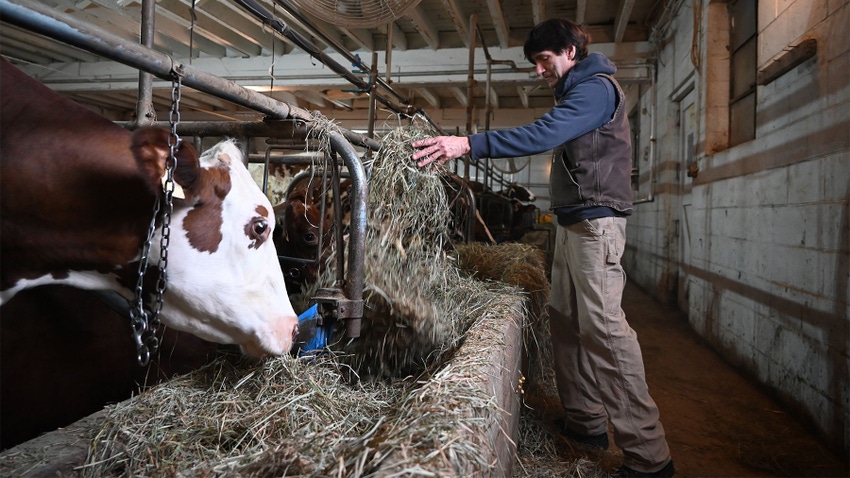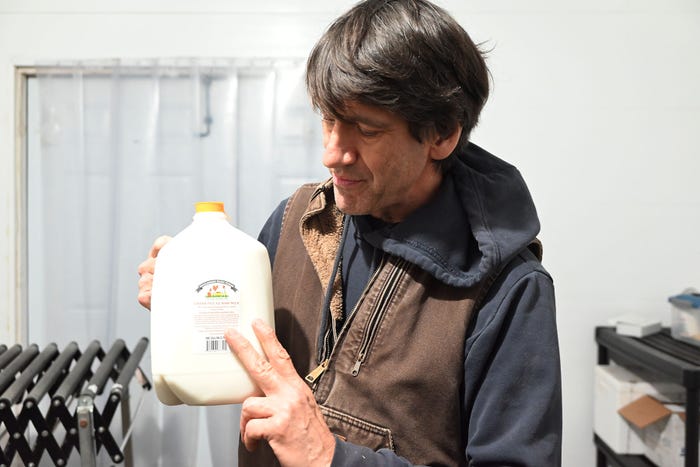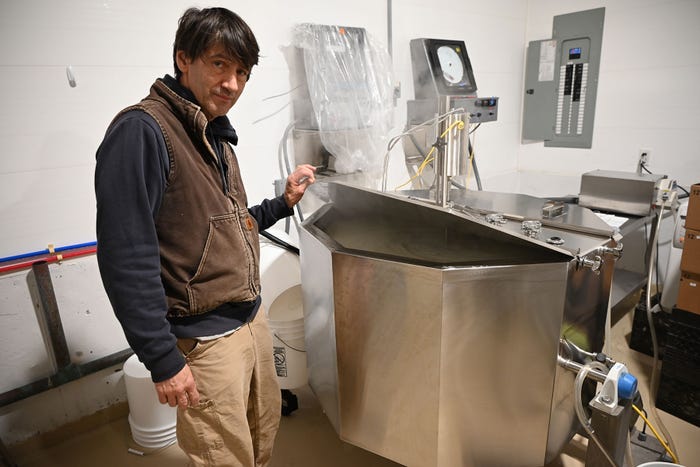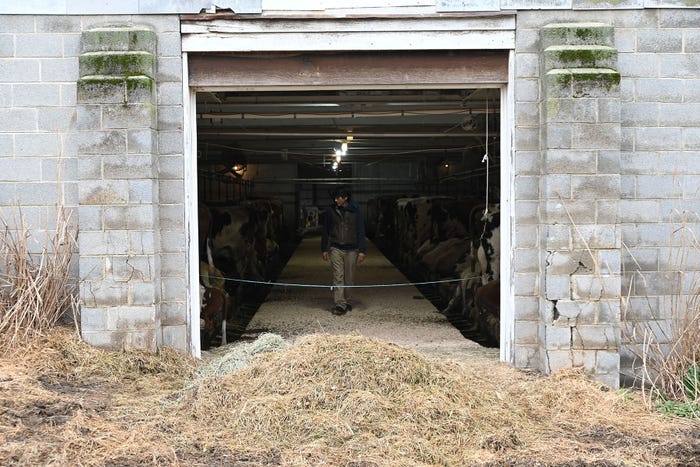
Amos Miller’s feud with the Pennsylvania Department of Agriculture has gotten attention far away from his farm in rural Lancaster County.
Miller, a Plain Sect dairy farmer who has refused to get a state-required license to sell raw, unpasteurized milk off his farm and is now being sued by the state’s Department of Agriculture, is seen by some as a champion of citizen’s rights and as a victim of government overreach.
An online fundraising campaign through GiveSendGo has raised more than $265,000 on his behalf. Even Robert F. Kennedy Jr., a candidate for president, has expressed support for Miller and his efforts to sell raw milk and its related products through what Miller describes as a private membership, not to the general public.
Members pay a one-time $35 fee to join. They can then buy anything they want from Miller’s farm.

WHOLESALE SELLER: The owner of Wholesome Dairy Farm, Lopez sells raw milk to local grocery stores. A veterinarian by trade, he used to work for large dairy farms to the west. He came back to his family’s dairy in Berks County, Pa., in the 2000s and started producing his own products that he sells direct to market.
But for Mark Lopez, who owns a 100-acre, 60-cow Ayrshire dairy in Yellow House, Pa., and has a permit to sell raw milk legally, the case isn’t complicated.
“What he’s doing, it’s illegal,” Lopez says. “And there’s people like myself and others who are complying with the rules. There is an expectation that somebody will have a second pair of eyes on the food. People make mistakes, and people get sloppy. It just happens; it’s just human nature.”
The owner of Wholesome Dairy Farm, Lopez sells raw milk to local grocery stores. A veterinarian by trade, he used to work for large dairy farms to the west. He came back to his family’s dairy in Berks County, Pa., in the 2000s and started producing his own products that he sells direct to market.
Along with the raw milk, he has a vat pasteurizer and processing area where he makes yogurt, keifer and other products.
He’s invited government officials, the Pennsylvania Department of Agriculture, and Food and Drug Administration officials onto his farm many times, he says, and has a good relationship with his farm inspector.
Many of Amos Miller’s supporters claim the government is just going after the “little guy.” Lopez disagrees.
“I am the little guy, but I’m following the rules. I think what they’re doing is wrong,” he says.
Jeff Biddle, owner of Bear Meadows Farm in Boalsburg, Pa., has been selling raw milk from his farm for 15 years with a permit. He says he spends thousands of dollars a year on testing and having the right equipment to ensure his milk is safe.
“And then somebody is not doing that,” Biddle says. “I think it hurts people out there who are doing it by the letter of law.”
Biddle produces raw milk and aged cheese, the only items that can be sold legally in Pennsylvania with a permit. The state requires raw milk cheese to go through a 60-day aging process, but Biddle lets some of his cheese age for much longer — nine months in some cases — to achieve maximum flavor.
He farms 190 acres and has 130 head of cows.

VAT PASTEURIZER: Along with the raw milk, Lopez has a vat pasteurizer and processing area where he makes yogurt, keifer and other products.
At Clover Creek Cheese Cellar in Williamsburg, Pa., a seasonal 80-acre, 59-head dairy farm, Dave Rice says he spends more than $3,000 a year having his milk tested and his herd checked for diseases such as brucellosis and Johne’s to ensure his raw milk is safe.
Rice says he is obsessive about keeping bacteria and coliform counts in his milk low. In Pennsylvania, coliform counts — a type of bacteria — in raw milk cannot exceed 10 per milliliter of milk. If coliform counts in his farm’s raw milk exceed 1 per milliliter, Rice says he will stop milking and clean everything down.
“I guess I feel strongly that getting that information on the quality of our milk and health of our herd to the public is important,” he says.
Rice’s herd is 100% grass-fed, which he says is an advantage because flocks of birds will not come in and dig into his feed, leaving fecal matter or other things behind. “I am a firm believer that cows on pasture are healthier,” he says.
His farm is also seasonal, so his calf pens aren’t used for six to 10 months out of the year. Any bacteria or diseases that build up in there, he says, die out.
Most of Rice’s raw milk is made into cheese, but about 20% of the milk he sells fluid. He started producing raw milk in 2005 after he quit dairy farming conventionally. He wanted a way to get his children involved in the farm operation, and his oldest son is now the farm’s cheesemaker.
Hodgepodge of laws
Depending on where you farm, the laws regarding raw milk sales vary greatly. Pennsylvania, for example, has one of the loosest laws on the books when it comes to allowing raw milk sales. Fluid raw milk and aged cheese can be sold on-farm and at retail, but producers must be licensed and go through mandatory testing. There are 114 licensed raw milk producers in the state.
New York and the New England states allow raw milk sales, but rules on where the raw milk can be sold vary by state. New York, for example, allows on-farm sales, but off-farm retail sales are illegal. And all producers must have a permit to do it.
Michigan and Ohio allow raw milk to be sold through a herd-share agreement between farm and consumer, but they don’t allow raw milk sales in stores.
Delaware and New Jersey have banned raw milk sales, and the federal government has banned interstate sale and transport of raw milk. The Farm-to-Consumer Legal Defense Fund has a map showing various laws by state.

PRESERVING THE FARM: A veterinarian by trade, Lopez used to work for large dairy farms to the west. He came back to his family’s dairy in Berks County, Pa., in the 2000s and started producing his own products that he sells direct to market. It was also a way to preserve his family’s farm, which he says goes back generations.
At a hearing last month, dozens of people came out to the Lancaster County Courthouse to support Miller. Some were his customers. Others were there to protest what they see as another case of the government trying to intrude on people’s rights.
For producers such as Biddle, the bottom line is producing a product that is safe, and proving to people that he’s doing everything he can to produce a safe product.
“I don't want to risk anybody's health at all, so I welcome the testing,” he says. “It gives all raw milk a bad name when somebody does this.”
About the Author(s)
You May Also Like






